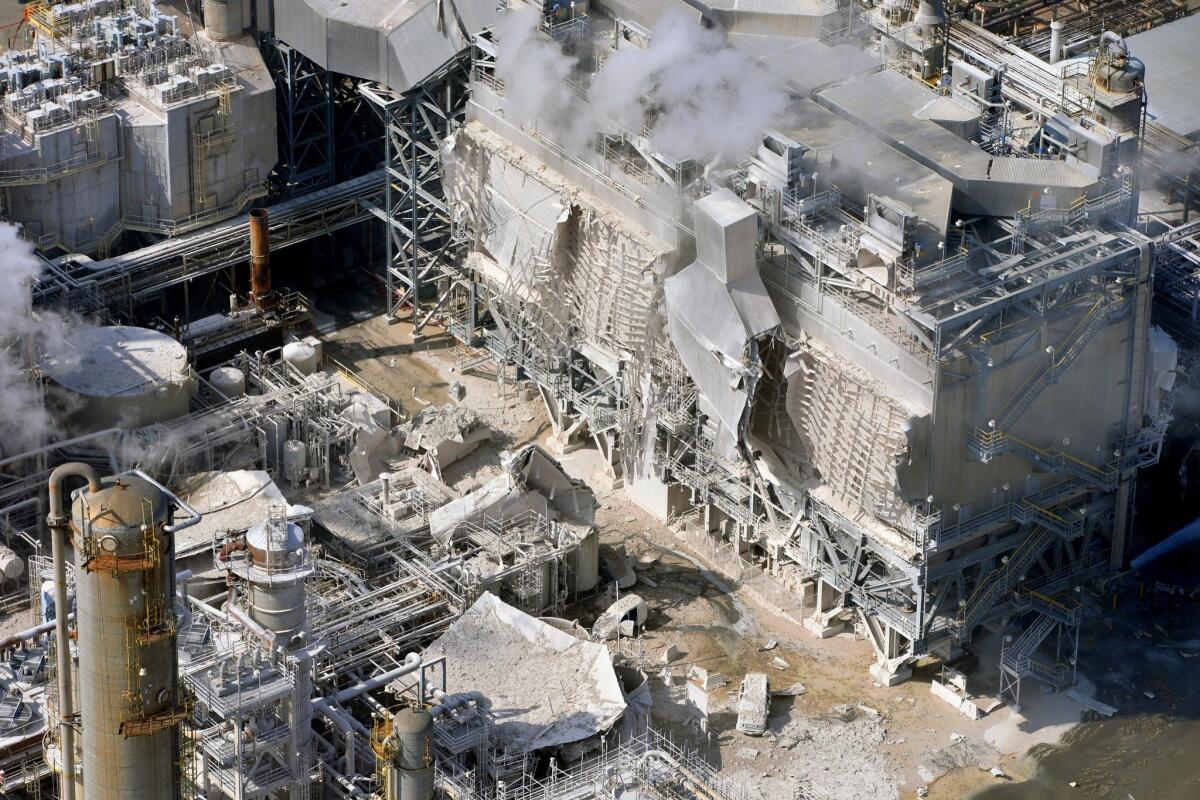Gas prices to stay high as Exxon Mobil refinery woes drag on

An explosion in February crippled Exxon Mobil’s refinery in Torrance. Regulators have balked at Exxon’s request to use an old pollution control unit to temporarily restore full operations.
- Share via
The refinery that has historically produced about a fifth of Southern California’s gasoline has been crippled since a February explosion — and may stay that way for months to come.
The trouble at Exxon Mobil’s refinery in Torrance is a major factor pushing up regional gas prices, which have risen dramatically this month. Restoring the site to full capacity is among the best hopes for bringing prices back down, according to analysts.
The Torrance refinery currently operates at less than 20% of its capacity, said Mohsen Nazemi of the South Coast Air Quality Management District.
Exxon Mobil asked the management district for approval to use an old pollution control unit it replaced in 2008 to temporarily restore full operations of the Torrance refinery, but regulators said the equipment does not capture emissions well enough. Emissions from the older unit would violate state regulations and rules.
Exxon Mobil would need a special exemption to use the old equipment, and the company still must demonstrate it has a plan to offset the effect of the increased emissions.
The old pollution control system, Nazemi said, emits 2 to 6 times more emissions into the air than the newer unit.
“It’s going to have an impact on the local community living down in Torrance,” said Nazemi, the management district’s deputy executive officer for engineering and compliance.
Meanwhile, the ongoing inventory shortage is affecting all Californians who drive. The average gas price in the L.A. area hit a new high for the month on Thursday at $4.30 — about 50 cents above the state average and $1.50 above the rest of the nation. On Friday, the average gas price in the L.A. area dropped a penny.
Angry consumers have been cursing and shaking their fists at gasoline pump prices, which in some areas such as downtown L.A. have exceeded $5.
“The biggest help will be when the Exxon Mobil refinery starts producing gasoline again,” said Gordon Schremp, senior fuels specialist for the California Energy Commission. “We don’t know where that stands at this time. Certainly all of us consumers would like to know.”
Analysts had expected the Exxon Mobil refinery to return to full service in July.
Now experts believe it won’t return to full operations for much longer, not until Exxon Mobil can repair the damage from the explosion and secure regulatory approval.
The repair will take time. The pollution control damaged in the explosion includes two units with some 1,300 plates that capture fine particulate matter. Exxon Mobil is replacing all of those plates, Nazemi said.
“That’s not going to happen next week or next month,” Nazemi said. “You’re probably looking at the end of the year.”
Todd Spitler, an Exxon Mobil spokesman, said the pollution control is “highly specialized equipment and intended to comply with California emissions standards.” He said the company is working with regulators to provide information about the company’s plans.
“But we are not in a position to speculate on a timeline for restart,” Spitler said.
In addition to regulatory hurdles in approving the backup pollution control system, the refinery also must work through an investigation into the causes of the explosion by the California Occupational Safety and Health Administration, the Environmental Protection Agency and the Chemical Safety Board.
In a report Thursday, the U.S. Energy Information Administration also noted the effect the Torrance refinery is having on gas prices, stating: “The West Coast retail price premium compared with the national average has been elevated since the February 18 explosion and fire at Exxon Mobil’s Torrance refinery in Southern California.”
In the five weeks after the Torrance outage, the administration stated, West Coast total motor gasoline inventories decreased by 3.0 million barrels. Gasoline inventories typically fall during that time of year, but the drop was sharper than in the previous two years.
After that initial decrease, storage levels recovered with support from imports. But during the week of July 3, a reported 1.1-million-barrel reduction in the inventory may have signaled more stress on the market.
California prices are always higher than national prices. Prices are driven up by about 70 cents per gallon by taxes and fees, state requirements to produce special low-pollution blends, and the relatively small number of refineries in the state.
Few refineries outside the state are equipped to produce California gasoline, so any interruption of capacity at California refineries has an outsized effect on supply — and prices.
“Recent changes in gasoline prices, while concerning for consumers, are consistent with the increased volatility that has been part of California fuel markets for the past several years,” said Catherine Reheis-Boyd, president of the Western States Petroleum Assn.
But the recent surge over the last week should begin to ease soon, as other refineries seek to produce more gasoline and as imports arrive. Consumers might see a slow decline in prices as gasoline stations were hit hard with the rapid increase in wholesale prices.
“Stations were losing their shirts on the way up,” said Patrick DeHaan, senior petroleum analyst for Gas Buddy. “Stations may not pass that [reduction in price] along for days. But we should start to see some relief.”
Twitter: @ivanlpenn.
ALSO
Why is California gasoline so expensive?
Drivers angry, resigned about gas-price jump
High gas prices driving you crazy? Do these simple things to slash your gasoline bill
More to Read
Inside the business of entertainment
The Wide Shot brings you news, analysis and insights on everything from streaming wars to production — and what it all means for the future.
You may occasionally receive promotional content from the Los Angeles Times.











